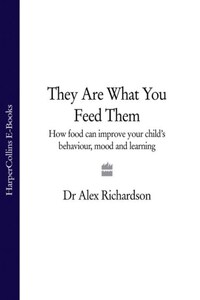I’ve written this book primarily for those of you who are parents and carers, and the information and advice have been tailored accordingly. Parents or guardians are usually the ones who have most responsibility for and influence over their children’s development, at least in the early years, and this is particularly true when it comes to food and diet. What parents don’t usually have, however, is easy access to reliable information about just how important good nutrition is to their child’s development—and especially to their child’s brain and behaviour.
Having said that, many of the parents I’ve met have taught me a great deal about the links between food and behaviour, and in this book I’ll be doing my best to share with you the insights I’ve gained from working with these parents and their children. Many of them know a great deal more about this subject than most specialists in child behaviour, and I’ve sprinkled quotes from them throughout the book. They have often gained their knowledge the hard way, however, and sadly the professionals officially in charge of helping them and their children have not always been receptive to suggestions that diet could in any way be relevant to these children’s difficulties in behaviour, learning or mood.
This book is about you taking charge and helping your child and yourself.
For this reason, although this book is written mainly for parents, I hope that the material here will also be useful to the many practitioners in health, education, social services or other fields who are struggling to help the children in their care, as well as to the many support groups and charities whose invaluable work has been helping to fill the huge gaps left by official research, policy and practice. In my experience, it is parents, along with some professionals and support groups, who have often been the unsung heroes who have actually made some of the most important discoveries about how diet can affect children’s behaviour. Science is only just starting to follow up some of these discoveries—and, as usual, government policy tends to lag way behind.
Why I Have Written This Book
For almost 20 years now I’ve been involved in scientific research into the nature and causes of many common difficulties in behaviour and learning. The children affected may have been labelled with terms like dyslexia, dyspraxia, ADHD or autism. In many cases there is no official ‘diagnosis’—and even when there is, this doesn’t always lead to effective solutions. For those who know what to look out for, the first signs of conditions like dyslexia, ADHD or other syndromes are there from early childhood, but these are not always recognized until much later—if at all—while the effects of the unexpected difficulties with behaviour and learning usually last a lifetime. They can also cause untold distress and misery if not properly identified and treated.
Early recognition, along with effective help, can make all the difference.
My primary aim as a researcher has always been to find better ways of identifying and helping people whose lives are affected by these kinds of difficulties. From my earlier background in teaching I first became aware of just how many children were actually affected, although most of them were not being given the help they really needed. What was preventing most of these children from achieving anything like their true potential, I realized, was our sheer ignorance of how human brains and minds really work—especially with respect to individual differences. This is what led me out of teaching and into the world of neuroscience research. At first, my scientific research had nothing to do with nutrition…or so I thought! But that view began to change as I recognized that nutritional issues cut across everything I was studying.
What on Earth Is Really Going On?
In both research and practice in health and education, children who have particular difficulties with behaviour or learning are often diagnosed as having conditions such as ADHD (attention-deficit hyperactivity disorder), dyslexia or specific reading difficulties (SRD), dyspraxia or developmental coordination disorder (DCD) or autistic spectrum disorders (ASD). For children with behavioural problems, ‘conduct disorder’ and ‘oppositional defiant disorder’ are the terms commonly applied. Learning difficulties may attract diagnoses such as ‘speech and language disorder’.








